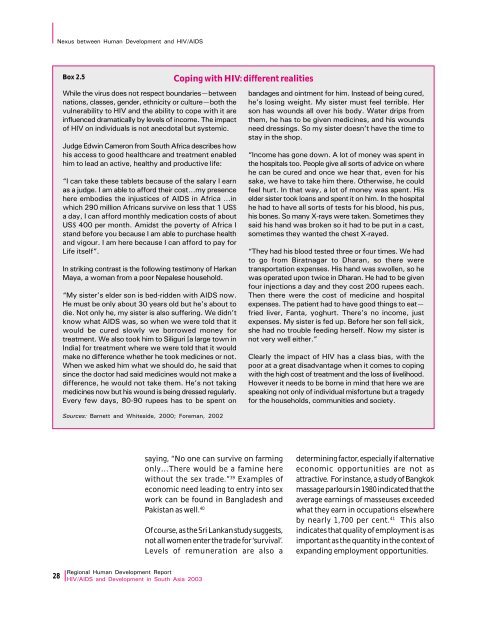Download Report - UNDP Asia-Pacific Regional Centre - United ...
Download Report - UNDP Asia-Pacific Regional Centre - United ...
Download Report - UNDP Asia-Pacific Regional Centre - United ...
Create successful ePaper yourself
Turn your PDF publications into a flip-book with our unique Google optimized e-Paper software.
Nexus between Human Development and HIV/AIDSBox 2.5While the virus does not respect boundaries—betweennations, classes, gender, ethnicity or culture—both thevulnerability to HIV and the ability to cope with it areinfluenced dramatically by levels of income. The impactof HIV on individuals is not anecdotal but systemic.Judge Edwin Cameron from South Africa describes howhis access to good healthcare and treatment enabledhim to lead an active, healthy and productive life:“I can take these tablets because of the salary I earnas a judge. I am able to afford their cost…my presencehere embodies the injustices of AIDS in Africa …inwhich 290 million Africans survive on less that 1 US$a day, I can afford monthly medication costs of aboutUS$ 400 per month. Amidst the poverty of Africa Istand before you because I am able to purchase healthand vigour. I am here because I can afford to pay forLife itself”.In striking contrast is the following testimony of HarkanMaya, a woman from a poor Nepalese household.“My sister’s elder son is bed-ridden with AIDS now.He must be only about 30 years old but he’s about todie. Not only he, my sister is also suffering. We didn’tknow what AIDS was, so when we were told that itwould be cured slowly we borrowed money fortreatment. We also took him to Siliguri [a large town inIndia] for treatment where we were told that it wouldmake no difference whether he took medicines or not.When we asked him what we should do, he said thatsince the doctor had said medicines would not make adifference, he would not take them. He’s not takingmedicines now but his wound is being dressed regularly.Every few days, 80-90 rupees has to be spent onSources: Barnett and Whiteside, 2000; oreman, 2002Coping with HIV: different realitiesbandages and ointment for him. Instead of being cured,he’s losing weight. My sister must feel terrible. Herson has wounds all over his body. Water drips fromthem, he has to be given medicines, and his woundsneed dressings. So my sister doesn’t have the time tostay in the shop.“Income has gone down. A lot of money was spent inthe hospitals too. People give all sorts of advice on wherehe can be cured and once we hear that, even for hissake, we have to take him there. Otherwise, he couldfeel hurt. In that way, a lot of money was spent. Hiselder sister took loans and spent it on him. In the hospitalhe had to have all sorts of tests for his blood, his pus,his bones. So many X-rays were taken. Sometimes theysaid his hand was broken so it had to be put in a cast,sometimes they wanted the chest X-rayed.“They had his blood tested three or four times. We hadto go from Biratnagar to Dharan, so there weretransportation expenses. His hand was swollen, so hewas operated upon twice in Dharan. He had to be givenfour injections a day and they cost 200 rupees each.Then there were the cost of medicine and hospitalexpenses. The patient had to have good things to eat—fried liver, anta, yoghurt. There’s no income, justexpenses. My sister is fed up. Before her son fell sick,she had no trouble feeding herself. Now my sister isnot very well either.”Clearly the impact of HIV has a class bias, with thepoor at a great disadvantage when it comes to copingwith the high cost of treatment and the loss of livelihood.However it needs to be borne in mind that here we arespeaking not only of individual misfortune but a tragedyfor the households, communities and society.saying, “No one can survive on farmingonly…There would be a famine herewithout the sex trade.” 39 Examples ofeconomic need leading to entry into sexwork can be found in Bangladesh andPakistan as well. 40Of course, as the Sri Lankan study suggests,not all women enter the trade for ‘survival’.Levels of remuneration are also adetermining factor, especially if alternativeeconomic opportunities are not asattractive. For instance, a study of Bangkokmassage parlours in 1980 indicated that theaverage earnings of masseuses exceededwhat they earn in occupations elsewhereby nearly 1,700 per cent. 41 This alsoindicates that quality of employment is asimportant as the quantity in the context ofexpanding employment opportunities.28<strong>Regional</strong> Human Development <strong>Report</strong>HIV/AIDS and Development in South <strong>Asia</strong> 2003
















